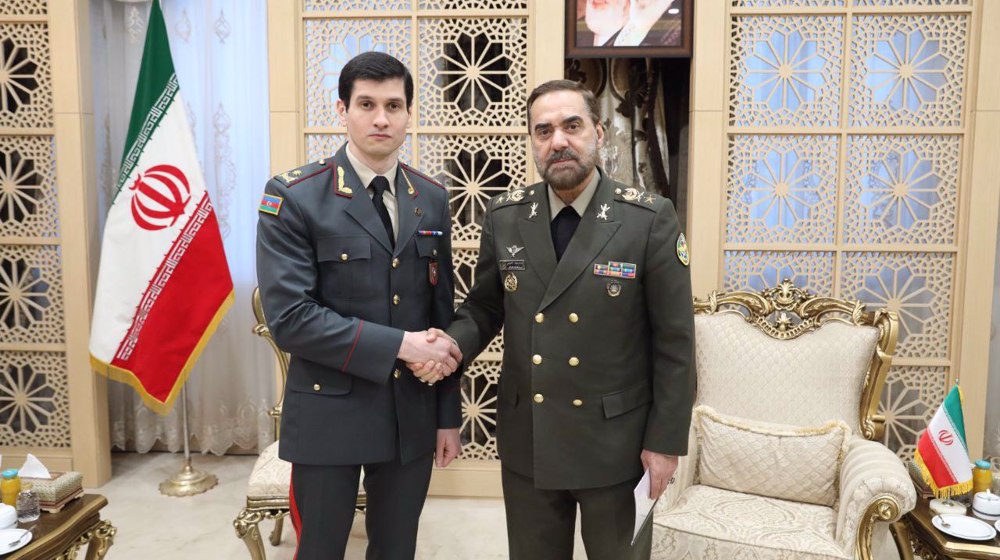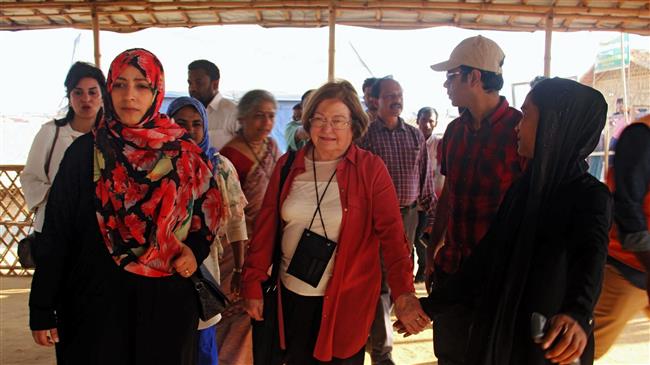Myanmar shuttling Buddhists to repopulate ex-Rohingya area
Myanmar’s government has been shuttling Buddhist nationals to repopulate the north of Rakhine State, which used to be dominated by minority Rohingya Muslims before they were driven out or killed in a campaign of state-sponsored violence.
The Buddhists, ethnic Rakhines from the south of the state, are being transferred to the state’s north, where Rohingya villages have already been torched or bulldozed to the ground.
Buddhist flags are now hung on bamboo poles at the entrance to villages.
The Myanmarese military laid siege to northern Rakhine, where the Rohingya were concentrated, in late 2016. Together with Buddhist mobs, soldiers began killing, raping, and torturing the Muslims in what has been described by rights groups as “ethnic cleansing” and possible “genocide.” That campaign intensified in August last year.
Thousands of Muslims are believed to have been killed, some execution-style.
Out of the original 1.1 million Rohingya Muslims who lived in Rakhine’s north, some 700,000 fled to neighboring Bangladesh. Some 300,000 had already been driven out since the 1970s.
Satellite imagery then showed that the Myanmarese regime was bulldozing what had been left of the villages, many of which had already been torched.
‘Like the Israeli settler project’
The regime is now upending the demography of the once majority-Muslim area in a pattern with echoes of “the Israeli settler project in the West Bank,” according to Francis Wade, author of “Myanmar’s Enemy Within: Buddhist Violence and the Making of the Muslim ‘Other.’”
“The military has been engineering the social landscape of northern Rakhine State so as to dilute the Rohingya population since the early 1990s,”said Wade. “I’d expect to see more Buddhists settle there over the coming years. And then we’ll forget what the area once was, and that process of erasure will be complete.”
On Monday, an international rights organization revealed that Myanmar’s military forces were also building army bases in locations where Rohingya Muslims used to live.
Myanmar has consistently denied that any violence has been taking place against the Rohingya, despite numerous witness accounts and other documents, including the satellite images.
Officials have even claimed that the majority of the Muslims remain in north Rakhine.
The United Nations has said it has strong suspicions that “acts of genocide” have taken place against the Rohingya in Myanmar.
Meanwhile, Myanmar has struck a deal with Bangladesh to return the Rohingya refugees, but the implementation of the deal remains unlikely amid continued violence and the reports of Buddhist settlements.
The country’s de facto leader, Aung San Suu Kyi — a winner of the Nobel Peace Prize — has tacitly backed the military crackdown.
VIDEO | Former FBI agent criticizes US Congress for 'outright corruption'
IRGC chief urges Muslim countries to cut aid routes to Israel
'New chapter in cooperation': Iran, Venezuela sign new MoUs
Jordan sentences former lawmaker for supporting Palestinian resistance
Basij volunteer forces hold massive drills in southwestern Iran
Israeli war criminals 'not welcome', US city says after ICC ruling
US vetoing of Gaza ceasefire resolution ‘disgraceful’: Iran’s UN envoy
VIDEO | IAEA adopts anti-Iran resolution tabled by E3















 This makes it easy to access the Press TV website
This makes it easy to access the Press TV website